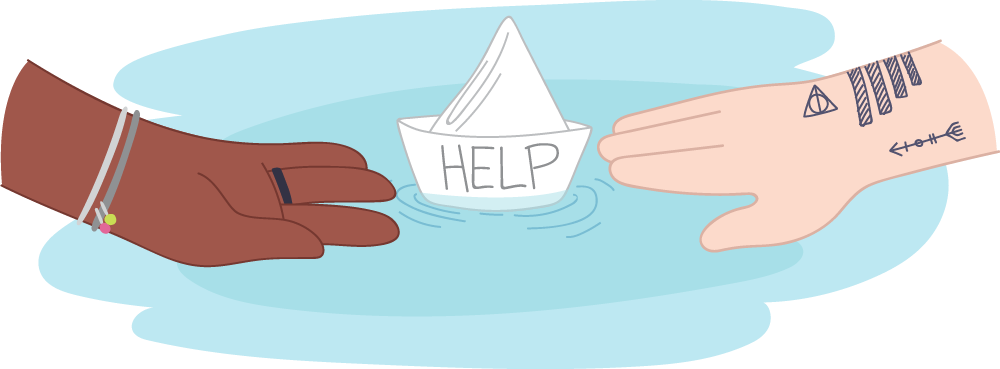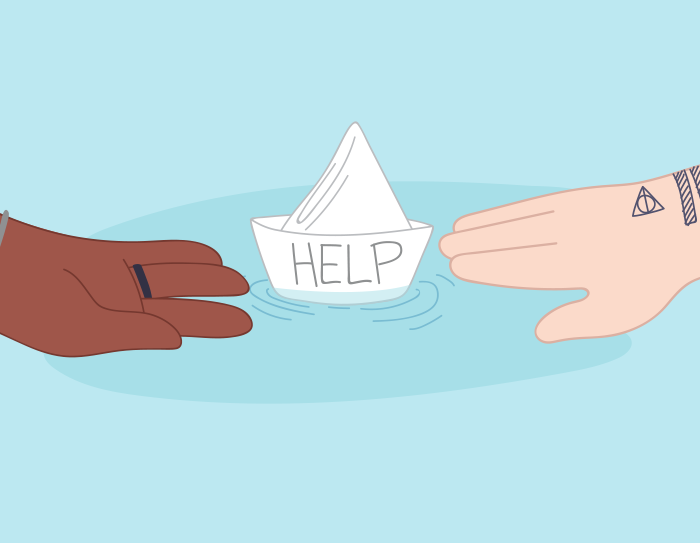How to ask for help
Sometimes we need help but we're not able to ask for it. We've got tips on how to ask for help when things get tough.

Managing everything on your own is fine - until it's not!
Asking for help, no matter how big or small the issue might be, is often hard to do. Some people see it as a negative thing but we’re here to show you that’s simply not the case!
Knowing that you’re in need of help can be hard to admit because we’re often taught to be self-reliant and independent.
Asking for help can feel very uncomfortable and some people describe having to ‘swallow their pride’ in order to reach out for support.
It takes courage to reach out and say that you’re not managing, you’re unsure about something, or you just need a shoulder to cry on.
I want help but I can't ask!
So what exactly gets in the way of asking for help?
Well, here’s a few important things that young people say stop them from reaching out:
They don’t really believe that talking about it, counselling or therapy will help
They or other people see it as a sign of weakness
They don’t like to rely on others and prefer to do things themselves
There is no one around that they feel able to talk to
They’re not sure who they can trust and if they will keep what they say confidential
They’ve tried asking for help in the past but it didn’t go very well and it put them off
It’s hard to know when it’s ok to cope by themselves or when they really need help
They justify their feelings or make excuses to themselves in order to avoid asking for help
It’s too expensive or they don’t have the right service in their neighbourhood
They’ve never done it before and feel scared or worried about what might happen
They're embarrassed or ashamed
While it might feel risky reaching out for help - it's important that you do
Sometimes we just need help and there's no shame in that. Everybody needs help at times including your parents, siblings, friends, co-workers, and supervisors!
Unfortunately, asking for help can bring up a lot of negative thoughts and feelings such as:
Helping someone is a win-win - it not only feels good for the person who is helping you but it's going to make your life a lot easier too!
So how do you know when to get help?
Asking for assistance is a really important skill to learn as it will help you throughout your life – in your relationships, at school, when you're a parent, and at work. Here's a few scenarios that might prompt you to ask for help:
Change your mindset
It's time to change the way you think about asking for help!
- Don’t fall into the trap of thinking you have to do everything yourself.
- Accept that you’re only human – you’re not supposed to be doing everything perfectly all the time.
- Helping another person actually makes us feel good – give your friends and family the chance to help you.
- Sharing your struggles with people you trust and asking for support strengthens your relationships.
- We might convince ourselves there’s never a good time to ask for help – don’t worry too much about that. What’s important is that you say something to somebody you trust.
- It takes courage to put yourself out there and ask for help – so be brave and give it a go.
Ask for help today - you can do it!
Practice asking for help with the little things, so when the big stuff happens you know what to do.
Remember, not matter how big or small the issue might be, asking for help is a good skill to have!
Everybody could use a little help. Kids Helpline is here for you 24/7 and we can help you with any issue, anytime. Give us a call, start a WebChat or email us today.
If you need more information for other digital services and resources, check out Head to Health.
Check these out too:
Sadness and depression
It’s okay to feel sad. It doesn’t necessarily mean you’...
READ MEAbuse in adult relationships
Learn about the different forms of abuse in relationships and where to ...
READ MECoping with emotions
Whether you’re dealing with anger, sadness, frustration or anxiety - it’...
READ MEI'm thinking about suicide
Experiencing suicidal thoughts or feelings? We cover what you can do and ...
READ METalking helps! We’re here for you.
No problem is too big or too small.
We're here 24 hours a day, 7 days a week






